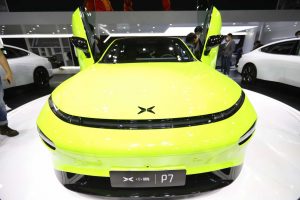China Tesla rival Nio sees deliveries fall in May as chip shortage bites

- Chinese electric car company Nio saw deliveries slide in May as the global chip shortage hit its business.
- Global automotive players have also been dealing with a semiconductor shortage which has impacted their business.
- Meanwhile, Chinese rival Xpeng said it delivered 5,686 cars in May — a 483% year-on-year rise and a 10% increase from the previous month.
In this article
- NIO
- XPEV
GUANGZHOU, China — Chinese electric car company Nio saw deliveries slide in May as the global chip shortage hit its business.
Meanwhile, rival Xpeng Motors saw vehicle deliveries accelerate in May as it managed to weather the same semiconductor shortage.
Xpeng was up around 5.5% in pre-market trade in the U.S. while Nio was 2.8% higher at 5:03 a.m. ET.
Global automotive players have also been dealing with a semiconductor shortage which has impacted their business.
Nio delivered 6,711 vehicles in May, a 95.3% year-on-year. However, that was a 5% decrease from April.
"In May, the Company's vehicle delivery was adversely impacted for several days due to the volatility of semiconductor supply and certain logistical adjustments," Nio said in a statement.
"Based on the current production and delivery plan, the Company will be able to accelerate the delivery in June to make up for the delays from May," the statement said, adding that it reiterates its delivery guidance of 21,000 to 22,000 vehicles in the second quarter of the year.
As of May 31, cumulative deliveries of Nio's three models — the ES8, ES6 and EC6 — reached 109,514 units.
Xpeng deliveries accelerate
Xpeng said it delivered 5,686 cars in May — a 483% year-on-year rise and a 10% increase from the previous month. That was faster than the 285% year-on-year surge and 0.9% month-on-month rise seen in April.
The company said last month it expects second quarter deliveries to be between 15,500 and 16,000 units.
Xpeng said that it delivered a record high 3,797 units of its P7 sports sedan in May. In January, the company began rolling out the next generation of its so-called "advanced driver-assistance system" (ADAS) called XPilot 3.0 to P7 cars. In the March quarter, the carmaker recorded revenue from the software for the first time.
The Chinese electric car maker delivered 1,889 of its G3 SUV in May.
Meanwhile, China had a five-day Labor holiday in May.
"May actually is a very challenging month for the industry, because obviously we mentioned there's been a supply chain constraint on this chip shortage. There's also the holidays, the May holidays imacted the delivery for the first half … of the month," Brian Gu, president of Xpeng Motors, told CNBC in an interview that will air Tuesday.
Still, despite the challenges, May registered a very robust increase for the company, he said.
"And also, I think most exciting to see is that renewed growth of our P7 product," Gu said. "We see actually a much stronger growth of that in our sales mix, so that gives us the confidence of really hitting our quarterly guidance and the numbers for this delivery … for the second half."
Read more about electric vehicles from CNBC Pro
The battery market is booming. One company believes it's made a key change to how they're made
Bank of America cuts Tesla price target by over 20%, says more stock sales could be coming
Missed the electric car boom? Analysts say these battery stocks are set to soar
In April, Xpeng Motors launched a new sedan called the P5 which it said would be delivered to customers in the third or fourth quarter of this year.
Xpeng Motors is one of the many rivals to Tesla in China, though it is significantly smaller in terms of delivery numbers. Xpeng's May numbers come just weeks after Tesla faced one of its worst public relations storms in China.
As of May 31, Xpeng's year-to-date total deliveries reached 24,173 units, representing a 427% year-on-year increase.
Source: Read Full Article
